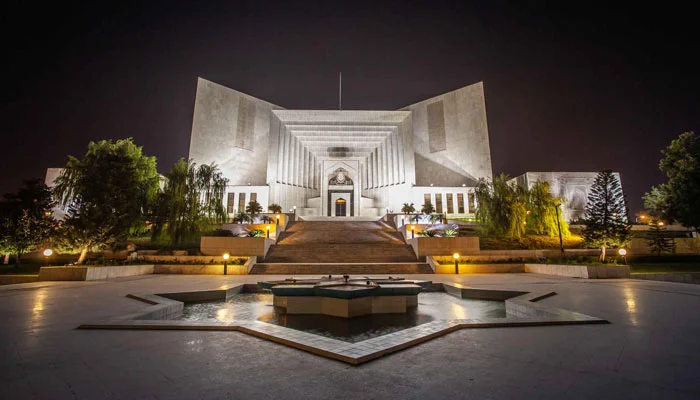The Supreme Court has called into question the utility of having caretaker governments.
The CJP said the constitutional amendment with regard to caretaker government was made in haste.
ISLAMABAD ( Web News )
The Supreme Court has called into question the utility of having caretaker governments. It has noted that the task to hold free and fair elections has been assigned in the Constitution to the Election Commission of Pakistan (ECP) and that the idea of caretaker setups was introduced later.
“One objective of a caretaker government is to ensure transparent elections. However, the responsibility for transparent elections lies with another institution [ECP] as per the Constitution.
“When this responsibility is vested in the ECP, what is the need for a caretaker government?” Chief Justice of Pakistan (CJP) Qazi Faez Isa said on Tuesday while hearing a case with regard to holding timely elections in the country.
Justice Isa, who was leading a three-member bench, noted that the person—military dictator General Ziaul Haq— who introduced the idea of caretaker government in the Constitution did not implement it himself.
“Zia induced the idea through the Eight Constitutional Amendment but when the government of Mohammad Khan Junejo was dismissed, a caretaker government was not formed. There have been two elections in the country without a caretaker government,” he added.
The CJP said the constitutional amendment with regard to caretaker government was made in haste. He, however, noted that it was for parliament to look into this matter.
Referring to the various governments from the era of General Ziaul Haq to the government of prime minister Nawaz Sharif in 2018, the CJP asked whether the concept of caretaker governments still exists in other countries.
“The concept of caretaker governments is in conflict with the preamble of the Constitution of Pakistan, which states that sovereignty belongs to Allah, and the system is to be run by the elected representatives of the people,” he added.
The petitioner’s counsel, Shah Khawar, said the Supreme Court on April 4 ordered authorities to hold elections in Punjab province on May 14 but the order could not be implemented. “We later moved the petition to hold elections all over Pakistan at the same time to develop a consensus.”
The CJP, however, noted that the real issue was the confusion surrounding the Supreme Court’s order. “What was that order? Where is the order of the day [in the Punjab election case]? ” he asked.
Two SC judges—Justice Ijazul Ahsan and Justice Sayyed Mazahar Ali Akbar Naqvi—on February 16 requested then CJP Umar Ata Bandial to take suo motu notice of a delay in announcement of polls in Punjab and Khyber Pakhtunkhwa (K-P) provinces, whose assemblies were dissolved in mid-January.
Justice Bandial started suo motu proceedings by forming a nine-member bench to hear the matter.
The former CJP, however, reconstituted a five-member bench to hear the matter. This bench on March 1 issued a split 3-2 verdict, empowering the president to announce the date of the Punjab polls, while directing the K-P governor to set the polls date for the provincial assembly in consultation with the ECP.
Three judges, who were part of the 9-judge bench—Justice Athar Minallah, Justice Syed Mansoor Ali Shah and Justice Yahya Afridi—however later stated in their notes that the petitions were rejected by a vote of 5:3, sparking a controversy.
Referring to the Punjab elections case, the CJP said, “This is the same case in which there were many judges and many decisions. “Some judges said, ‘This is a court order’, while others said, ‘No, this is not a court order’. In this case, there was either a three judges’ order or a five judges’ order,” he noted.

